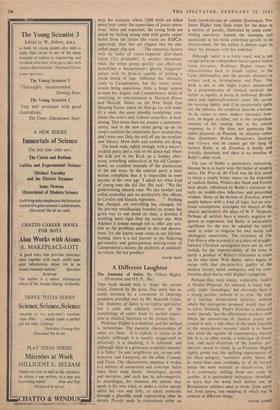A Different Laughter
The Anatomy of Satire. By Gilbert Highet. (Princeton and O.U.P., 30s.) THIS book should help to dispel the current belief, fostered by the press, that satire was re- cently invented by a committee of Oxbridge graduates presided over by Mr. Kenneth Tynan. The Anatomy of Satire is no topical pot-boiler, but a calm and scholarly survey of 'the morphology of satire' from its earliest expres- sion in classical literature to the present day.
Professor Highet is a classicist, and his method is Aristotelian. The essential characteristics of satire are these: 'it is topical, it claims to be realistic (although it is usually exaggerated or distorted); it is shocking; it is informal; and (although often in a grotesque or painful manner) it is funny.' Its near neighbours are, on one side, Invective and Lampoon; on the other, Comedy and Farce. The characteristic response it evokes is a mixture of amusement and contempt. Satire takes three main forms: monologue, parody and narrative, and each has its sub-categories. In monologue, for instance, the satirist may speak in his own voice, or make a victim openly admit his vice and folly, or speak ironically through a plausible mask representing what he detests. Parody tends to concentrate either on form (mock-heroic) or content (burlesque). Pro- fessor Highet even finds room for the hoax as a version of parody, illustrated by some enter- taining anecdotes. Indeed, the examples and quotations in this book contribute greatly to its attractiveness, for the author is always eager to share his pleasure with his audience.
Although 'satire' is a Latin word, and is not recognised as an independent literary genre before Latin literature, Professor Highet traces its characteristics back to Greek culture, to the Cynic philosophers and the parodic elements in writers such as Aristophanes and Plato. The book is not, as one might expect, unbalanced by a preponderance of classical material; the author is equally at home in mediceval, Renais- sance and eighteenth-century satire. He carries his learning lightly, and if he occasionally spells out the obvious, his erudition disarms criticism. As he comes to more modern literature, how- ever, he begins to falter, not in the comprehen- siveness of his reading. but in his critical responses to it He does not appreciate the subtle pleasures of Peacock, he obscures rather than illuminates Bishop Blougram's Apology and Ulysses, and he cannot get the hang of Samuel Butler at all. Erewhon is briefly and irritably dismissed. and there is no mention of Butler's other work The case of Butler is particularly interesting, because he is in many ways the father of modern satire. The Way of All Flesh was the first novel to focus a totally ironic vision on the materials of realistic fiction. Writers like Shaw and Forster were deeply influenced by Butler's irreverent at- tacks on middle-class behaviour and proverbial wisdom. Many of the devices of Erewhon, where people behave with a kind of logic, but on irra- tional assumptions, anticipate the theatre of the absurd, particularly the plays of N. F Simpson. Perhaps all satirists have a mainly negative re- sponse to experience, but Butler is particularly significant for the way he adopted the satiric mask in order to disguise his own moral and ideological uncertainty. The reviewers of The Fair Haven who accepted it as a piece of straight- forward Christian apologetics were not so very foolish, for the impenetrability of the irony is partly a product of Butler's reluctance to make up his own mind. With Butler, satire begins to merge with that characteristic quality of the modern literary mind, ambiguity; and the com- bination plays havoc with Highet's categories.
Perhaps they were always vulnerable. Swift's A Modest Proposal, for instance, is listed, logi- cally, under 'monologue,' but obviously there is a strong parodic element in its style, the style of a rational, disinterested reformer, without which the outrageous proposal would lose all its force. Similarly, Pope's Dunciaci is discussed under 'parody,' but the affectionate mockery-with which the conventions of classical poetry are evoked is only a side-effect of the main function of the mock-heroic manner, which is to throw into relief the squalor of contemporary literary life. It is, in other words, a technique of distor- tion, and such distortion of the familiar per- spective, moral or visual, is, as Professor Highet rightly points out, the unifying characteristic of his third category, 'narrative' satire. Satire,' as he more than once confesses, is, of all literary forms the most resistant to classification, for it is continually shifting from one mode to another. It is particularly instructive, therefore, to learn that the word itself derives not, as Renaissance scholars used to think, from satyr, but from satura, one meaning of which was 'a mixture of different things.'
DAVID LODGE


































 Previous page
Previous page